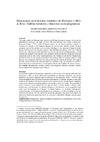Identificador persistente para citar o vincular este elemento:
https://accedacris.ulpgc.es/jspui/handle/10553/42373
| Campo DC | Valor | idioma |
|---|---|---|
| dc.contributor.author | González Cruz, María Isabel | en_US |
| dc.date.accessioned | 2018-11-05T14:21:41Z | - |
| dc.date.available | 2018-11-05T14:21:41Z | - |
| dc.date.issued | 2018 | en_US |
| dc.identifier.issn | 2000-3560 | en_US |
| dc.identifier.uri | https://accedacris.ulpgc.es/handle/10553/42373 | - |
| dc.description.abstract | Este artículo estudia los hispanismos empleados en 25 novelas rosa inglesas publicadas por Harlequin y Mills & Boon, editoriales especialistas en literatura romántica. Los textos pertenecen al corpus compilado para el proyecto de investigación FFI2014-53962-P,2que aborda un análisis interdisciplinar de novelas ambientadas en Canarias (España) y otras islas atlánticas. El estudio revela que la mayoría de las autoras recurre a la alternancia lingüística como recurso literario, insertando palabras, expresiones y frases en español. Tras describir el marco literario y socio-cultural de este tipo de obras y revisar algunos estudios sobre hispanismos, examinaremos los ámbitos temáticos y las funciones socio-pragmáticas que estas voces desempeñan en el discurso en lengua inglesa. Los resultados indican que, semánticamente, los hispanismos utilizados no se restringen a la esfera romántica y que sus funciones discursivas van más allá de la referencial, apuntando más bien al desempeño de una macro-función de representación de los contextos e identidades bilingües que presentan las novelas. | en_US |
| dc.description.abstract | This paper studies the Hispanicisms employed in 25 English popular romance fiction novels published by Harlequin and Mills & Boon. The texts belong to the corpus compiled for Research Project FFI2014-53962-P, (1)which focuses on an interdisciplinary analysis of romances set mainly in the Canaries (Spain), but also in other Atlantic islands. In these romances, most of the authors resort to code-switching, i.e. the insertion of Spanish words, phrases and sentences, as a literary strategy. After offering a description of the socio-cultural framework of this type of works and a brief review of some studies on Hispanicisms, we will examine the semantic fields and the socio-pragmatic functions that these Spanish words and expressions seem to play in the English discourse. Our findings reveal that the Hispanicisms used in the texts are not merely restricted to the semantic field of 'romance and love', and that the socio-pragmatic functions they play go beyond the referential function. We suggest that the variety of functions detected seem to contribute to the performance of a kind of macro-function of representation of the bilingual contexts and identities the novels portray. | en_US |
| dc.language | spa | en_US |
| dc.publisher | 2000-3560 | |
| dc.relation | Discursos, Género E Identidad en Un Corpus de Novela Rosa Inglesa Ambientada en Canarias y Otras Islas Atlánticas. | en_US |
| dc.relation.ispartof | Moderna Sprak | en_US |
| dc.source | Moderna Sprak [ISSN 2000-3560], v. 112 (1), p. 165-186 | en_US |
| dc.subject | 57 Lingüística | en_US |
| dc.subject.other | Hispanismos | en_US |
| dc.subject.other | Campos semánticos | en_US |
| dc.subject.other | Funciones socio-pragmáticas | en_US |
| dc.subject.other | Novela rosa | en_US |
| dc.subject.other | Bibliografía inglesa sobre Canarias | en_US |
| dc.subject.other | Hispanicisms | en_US |
| dc.subject.other | Semantic fields | en_US |
| dc.subject.other | Socio-pragmatic functions | en_US |
| dc.subject.other | Popular romance fiction | en_US |
| dc.subject.other | English bibliography on the Canaries | en_US |
| dc.title | Hispanismos en el discurso romántico de Harlequin y Mills & Boon. Ámbitos temáticos y funciones socio-pragmáticas | en_US |
| dc.title.alternative | Hispanicisms in the romantic speech of Harlequin and Mills and Boon. Thematic areas and functions socio-pragmatic | en_US |
| dc.type | info:eu-repo/semantics/Article | en_US |
| dc.type | Article | en_US |
| dc.identifier.isi | 000445371600008 | |
| dc.description.lastpage | 186 | - |
| dc.identifier.issue | 1 | - |
| dc.description.firstpage | 165 | - |
| dc.relation.volume | 112 | - |
| dc.investigacion | Artes y Humanidades | en_US |
| dc.type2 | Artículo | en_US |
| dc.contributor.daisngid | 13052934 | |
| dc.contributor.wosstandard | WOS:Gonzalez-Cruz, MI | |
| dc.date.coverdate | 2018 | |
| dc.identifier.ulpgc | Sí | es |
| dc.description.sjr | 0,158 | |
| dc.description.sjrq | Q2 | |
| dc.description.ahci | AHCI | |
| dc.description.scie | SCIE | |
| dc.description.ssci | SSCI | |
| item.fulltext | Con texto completo | - |
| item.grantfulltext | open | - |
| crisitem.author.dept | GIR Estudios sociolingüísticos y socioculturales | - |
| crisitem.author.dept | Departamento de Filología Moderna, Traducción e Interpretación | - |
| crisitem.author.orcid | 0000-0002-6815-2743 | - |
| crisitem.author.parentorg | Departamento de Filología Moderna, Traducción e Interpretación | - |
| crisitem.author.fullName | González Cruz, María Isabel | - |
| crisitem.project.principalinvestigator | González Cruz, María Isabel | - |
| Colección: | Artículos | |
Los elementos en ULPGC accedaCRIS están protegidos por derechos de autor con todos los derechos reservados, a menos que se indique lo contrario.
